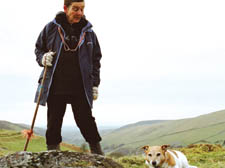|
|
 |
| |

Sleep Furiously |
Sleep is a film fan's dream
SLEEP FURIOUSLY
Directed by Gideon Koppel
Certificate PG
THIS is one of the most surprising films you will see this year, and the story of a small Welsh hillside village will linger long in your imagination after the gorgeous, final scenes have slipped quietly by.
It is almost impossible to know what awaits as director Gideon Koppel’s cameras imperceptibly pan their way across a rolling valley. Somewhere in the distance, a farmhand is carefully going about his day’s work, helping bring in the hay harvest. A school lesson, partly taught in Welsh, is taking place. A music teacher plays the piano while his charges offer percussion accompaniment.
With a minimal soundtrack (composed by the deep-house producers Aphex Twin) Koppel allows the audience to revel in near silence while the wind follows the contours of the land.
The people of Trefeurig are hill farmers and Koppel’s parents found the serene valley as wartime refugees. Koppel’s affection for the people who gave his parents a haven is obvious through his unobtrusive direction that simply allows the landscape and those who populate it to fill the screen. He has no need to “Welsh up” these people: he has not dropped in singers from the valleys, hidden Methodist chapels or unemployed miners.
Instead, there are scenes of farmers crouching in the shade of large tractor wheels as they eat their sandwiches. We watch ploughing equipment being attached to the back of a tractor, and then a surprisingly hypnotic and satisfying piece of machinery which wraps those rolls of hay (the ones that look like giant shredded wheat) in black plastic.
The viewer has to match the patience of the film-maker, who spent days sitting on the hillsides with a camera rolling, setting up hugely long single shot takes that allow his subjects to walk in and out again of view in their own time. This is no chore: his scenes of rural life have a Constable sensibility to them and the camera, rather than being a piece of equipment to track the actions of an actor, is a magical window offering a eulogy to our countryside in the same vein as the books of Laurie Lee.
Characters crop up, but not in a condescending, “look at the sweet little countryfolk” kind of way that would be easy for a metropolitan film-maker to lapse into.
John Jones drives the area’s mobile library, an unmissable yellow van which pootles through tiny country lanes to find slate-topped stone cottages. He provides a narrative journey as Koppel can use his doorstep deliveries to give a glimpse of other lives.
Koppel’s mother Pip also appears – we discover that the film-maker had gone to the valley on holiday as an eight-year-old and his family of German-Jewish immigrants moved there permanently when he was aged 12. We watch her carefully place a stone on the grave of her late husband Heinz: she is a beautiful woman in her 70s, with an air of graciousness about her. She sums up in her simple movements and striking face a gentle changing of seasons that Koppel’s patient cameras have captured.
Most of all, this is a film heavily laced with a sleepy, dreamy quality as if the very essence of this quiet corner of planet Earth has somehow seeped into the lens and found it a cosy place to linger. Unpretentious, enthralling and poetic: a quirky, original masterpiece. |
 |
|
 |
| |
|
 |
|

